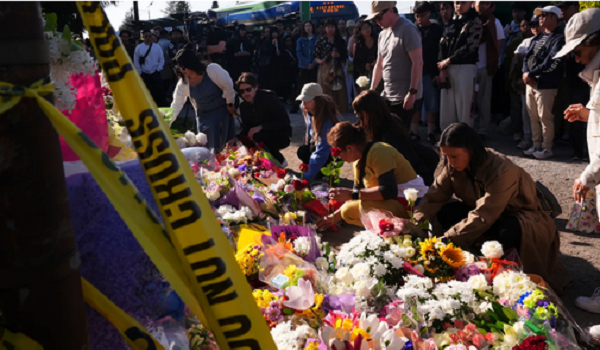Filipino community vows to stand strong following Vancouver street vehicle attack
Vancouver’s acting police chief said that Saturday was the city’s darkest day. It was also the darkest for Canada’s dynamic and growing Filipino community.
The vehicle attack that killed 11 people at a street festival Saturday night left its roughly one million members reeling.
“We will feel this for a long time,” said RJ Aquino, chair of Filipino B.C. His voice broke as he described how panicked messages and calls poured into his phone after the attack on the festival, Lapu-Lapu Day.
Sitting next to him at a press conference, B.C. MLA Mable Elmore spoke of the “mad scramble” that followed. Before that, “it was a sunny day, it was a beautiful day for a celebration. Everyone was happy.”
She, too, was in tears as she described the aftermath for survivors and for the broader community. “We are in incredible pain,” she said.
But she also spoke of the community’s resilience. So did others. “Even in the face of sorrow, our community’s spirit remains unshaken. We will continue to celebrate our culture, not just as a tradition, but as a powerful expression of resistance, pride, and hope,” said Marites de Jesus, director of National Filipino Heritage Canada, in an e-mail message.
Mr. Aquino of Filipino B.C. referred to the “bayanihan spirit,” a willingness to pull together in times of trouble.
By Sunday, groups across the country were already starting online campaigns to raise money for the victims’ families. Across social media, Filipinos rallied to raise awareness about blood donations in the Vancouver area.
One of the victims was Rizza Azzir, according to online posts. Police are not identifying the others yet, though they said the victims ranged in age from 5 to 65.
Ms. Azzir was identified in Facebook posts and a GoFundMe campaign started by her cousin, Shelby Pacumio.
Ms. Azzir and her husband moved from the Philippines to Winnipeg “in search of a better life,” the GoFundMe page says.
Sydney Roa, who was at the festival but left before the attack, set up a GoFundMe page on behalf of a Vancouver-based organization that she runs, Tadhana Toys, which provides clothes, books and games to children in hospitals, low-income families and new immigrants.
“Filipinos like to help each other,” she said. “You know, you see a Filipino, I don’t know, at the mall, and you say ‘hi,’ they’re more than happy to say ‘hi’ back. There’s this universal connection. “
Others spoke of the community’s contribution to Canada. British Columbia Premier David Eby pointed out there were probably few in the province who were not touched by care given by a Filipino, whether it is in long-term-care homes, hospitals, child care or schools.
In a statement in June marking a month-long celebration of Filipino heritage, Diversity Minister Kamal Khera said that “due to their recognized expertise in nursing and health care,” Filipino Canadians were “strengthening Canada’s health care system and supporting the well-being of Canadian families.”
Filipinos began arriving in Canada in large numbers in the 1960s. Thousands of Filipinas came under the government’s live-in caregiver program, often working long hours so they could send money home to their families.
By the 2021 census, 957,355 people reported being of Filipino ethnic origin. Greater Toronto had the biggest community, at 272,470, followed by Vancouver (141,230), Calgary (83,815), Winnipeg (81,140), Edmonton (77,085) and Montreal (39,020).
The community continues to boom. A Statistics Canada report from 2023 said that “over one-third of Canadians reporting Filipino roots living in Canada in 2021 arrived within the previous decade.”
Most are Roman Catholics. On Sunday, flags at St. Mary’s Parish in Vancouver flew at half-mast as the largely Filipino congregation filled the church.
Father Joseph D’Souza asked for a moment of silence in recognition of what he called the “tragic incident” on Saturday night. After the service, Angelo and Jennifer Tuazon reflected on what had happened.
“It’s a sad day. It was the second year for that festival and instead of joy, now it’s going to be remembered differently,” Mr. Tuazon said as the couple and their 13-year-daughter and five-year-old son left the church.
This article was first reported by The Globe and Mail














